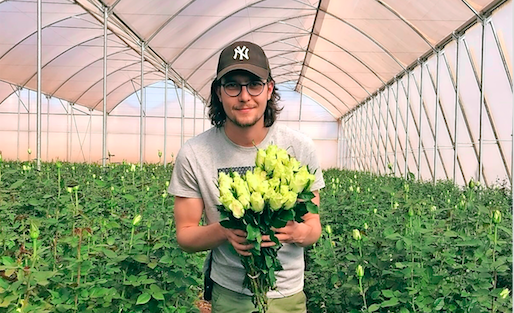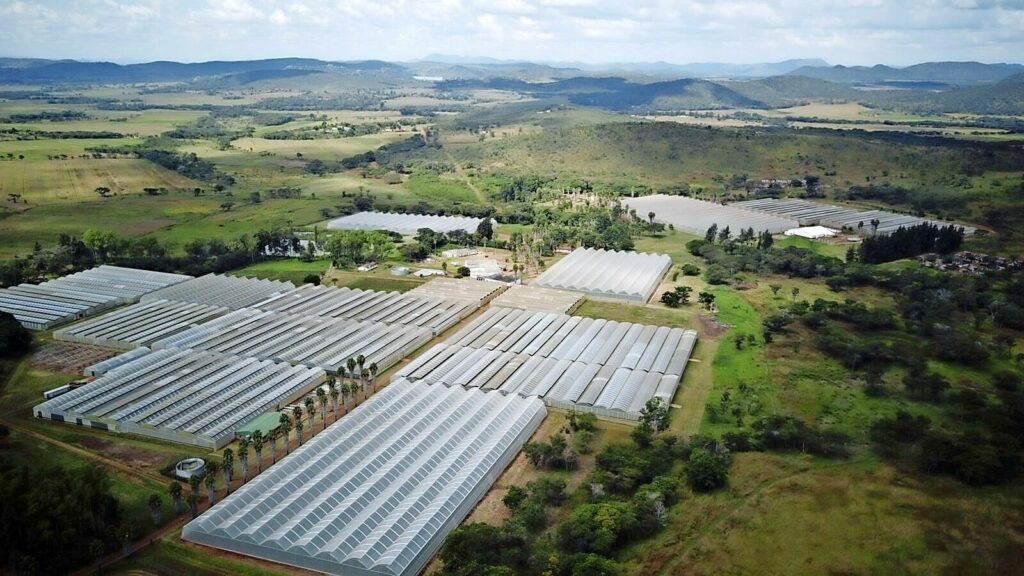Only three days after he’d finished his university studies in the Netherlands, Roelof Nugteren booked a one-way ticket to Zimbabwe to go and work at Luxaflor, the rose company of his father Aart. This was half a year ago, not long after dictator Robert Mugabe had been pushed out and his party colleague Emmerson Mnangagwa had taken over the role of President. There was a strong hope for change in the country, which had been driven into a crisis by Mugabe’s politics.
The first elections took place at the end of last month. Mnangagwa won, and after some unrest, police action and arrests, calm has returned. Nugteren is positive about the future of the Zimbabwean agriculture and horticulture. A feeling that’s reinforced by the expansion plans for the Luxaflor rose nursery. “There was a time when horticulture was huge in Zimbabwe, and that’s what they want to bring back. I’m sure they’ll succeed. It’s up to us to make the first steps.”

“It’s peaceful here at the moment”, reports Roelof Nugteren, who loves it in Zimbabwe, this Friday morning from the Luxaflor office. We’d heard that the parliamentary and presidential elections had been accompanied by unrest, tough actions by the Zimbabwean army and police at opposition demonstrations, followed by arrests of opposition leaders. Roelof recognizes this. The day before yesterday, another person was arrested. Why exactly, he doesn’t know. But the turmoil, which was concentrated in capital city Harare, is over now according to Roelof.
Protests in Harare
Mnagagwa, the man who helped overthrow Mugabe, won the presidential elections. His party ZANU-PF got the majority in the parliamentary elections. Roelof: “He got 80 to 90% of the votes in all rural areas. The only place where many people were against him, was capital city Harare. Unemployment is very high there. November last year, everyone was jumping for joy at the prospect of change after all that time. And now, people in the cities already want to see more changes. It’s important to stay realistic.”
Roelof feels that a win for Nelson Chamisa of the opposition party Movement of Democratic Change (MDC) wouldn’t have been better for Zimbabwe. “Chamisa promises the population all sorts of things, but he wouldn’t be able to deliver, because he doesn’t have any international contacts. Mnangagwa’s past might not be great, but foreign companies and organisations all know him. He’ll open Zimbabwe’s borders for international trade. What Zimbabwe needs now is hard currency, and Mnangagwa will be able to attract investors.”
Investors wanted
Roelof has already seen many improvements in Zimbabwe during the last couple of months. “It isn’t hard to make promises to the population. But ZANU-PF has actually invested a lot in Harare airport and in road construction. And they’re currently negotiating with banks and companies, trying to get investors to come over.”

Last month, the minimum wage was increased by 8-10% in Zimbabwe. This will give the local population more purchasing power. Roelof: “ZANU PF is the best party for employers, we can see they’re trying their best. For example by offering foreign companies the opportunity to purchase land. When Mugabe was in power, the country suffered from a brain drain, a lot of skills and knowledge was gone. But nowadays, more and more highly-trained people are returning.”
Roelof himself is a good example of this. In the past, the situation wasn’t safe for the Nugteren family. Father Aart took his wife and children back to the Netherlands. The nursery was even confiscated by Mugabe’s men for some time. But things improved during the last couple of years. In November 2017, Aart reported that they’d been making a profit again and that the company had expanded to 16.5 ha.
Roelof: “I’m 26 now and I recently returned to Zimbabwe. I bought a one-way ticket three days after my graduation. I like it here. And I’ve noticed there are more people of my age who see opportunities here. Zimbabwe was Africa’s breadbasket in the eighties. The government encourages exports, because that’ll bring in hard currency. There was a time when horticulture was huge in Zimbabwe, and that’s what they want to bring back. I’m sure they’ll succeed. It’s up to us to make the first steps.”
Expand to 200ha
Luxaflor has 16.5 ha of greenhouses now and they want to expand to 40-45 ha by the end of next year, says Roelof. The ultimate goal is a rose nursery of 200 ha. “We provide a lot of employment for the local population. We’ve got 450 permanent employees at the moment. Expanding the nursery means we’ve got to invest in schools, medical clinics and housing too. That’s part of being Fair Trade certified. The most challenging part of further expansions is to find the required skills and knowledge in Zimbabwe. If we can’t find it here, we might have to get it from Kenya.”
Luxaflor will continue to focus on roses, ensures Roelof. He feels that Zimbabwean roses – there are currently four growers – can compete with the Kenyan ones. “In winter, our buds have the same size, maybe even larger. And we don’t get as much rain, reducing the risk of pests and diseases.”
Holland and South-Africa
Luxaflor distributes their roses via the auctions in the Netherlands and in Johannusburg, South Africa. During the European summer period, the company ships more roses to South Africa, where it’s winter then. Roelof points out that Zimbabwe is much closer to South Africa than competitor Kenya, which means lower freight costs.
According to Roelof Luxaflor isn’t the only one that’s investing in the Zimbabwean horticultural industry. “There are plenty of people who can’t wait to make the country a better place. Some locals have already started expanding with flowers. And there’s growth in sweetcorn, tomatoes, grains and cabbage too. Zimbabwe exports a lot of fruit and vegetables. The shops are filled with them.”
Roelof says there are new investments in the mining industry and road construction too. And they’re also working on the railways. “Things are really changing, you can get a loan at the bank now. Some Dutch entrepreneurs are making a start with livestock and poultry companies. South Africans are active in nuts and avocados. Business is developing rapidly now.”
Oasis in Zimbabwe
A trade mission from the Netherlands, which included a few livestock farmers, also visited Luxaflor on their tour in June. Roelof remembers the many positive responses. “They thought our company was an oasis in Zimbabwe. They were amazed. I’m sure they’ll come back to Zimbabwe.”
Luxaflor doesn’t get any assistance from the government. But the government is talking to them regarding the potential for Zimbabwe, they want to know if they can be as big in horticulture as Kenya. “The government wants businesses to grow, they’re talking to people and showing an interest. We can transfer our knowledge to other farms. Hopefully, Zimbabwe will be the number 1 again one day. That’s a great ambition, but it’ll take a lot of hard work”, concludes the young horticultural entrepreneur.









